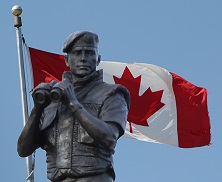True and Fascinating Canadian History
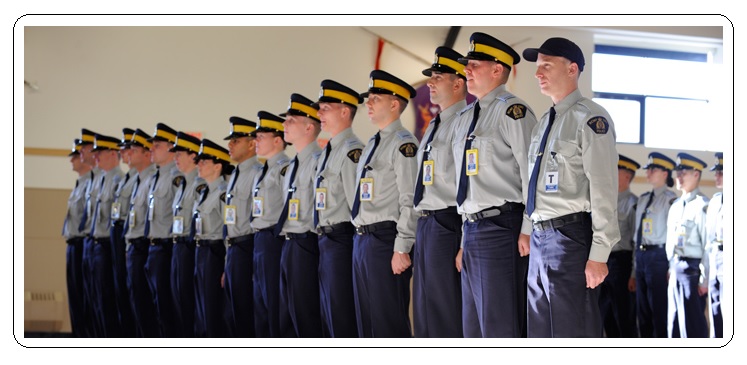
Vet of the Month: March, 2022
Reg.#778, Constable Orlando Worthington
RCMP Vets. Ottawa, ON

In the minds of most Canadians, the RCMP has very stringent hiring policies, and as a result only the best qualified young Canadians are successful in gaining entrance into its ranks. But in spite of demanding safeguards, occasionally a bad apple slips in. In 2019, an RCMP constable from British Columbia was charged in a 2013 assault case that took place at a McDonald's restaurant in Edmonton, AB. The case was embarrassing to RCMP recruiters, but it was an exception. How the constable was able to get hired by the RCMP in the first place is a mystery. It is often said of the RCMP, "It's near impossible to get in and much harder to get out". But it hasn't always been that way as this little story will attest. We'll begin with a brief overview of the present day RCMP hiring protocols, and compare them to the recruiting requirements of the North West Mounted Police (NWMP) in days of yore. The recruit's name was Orlando Worthington, and he too was a bad apple.

Today, the initial application process for entry into the RCMP is rigourous and lengthy. Most young people find it detailed and very personal, but it is all mandatory. For the serious minded, strenuous physical tests require months of body conditioning otherwise one gets washed out. The applicant's skills and knowledge are tested during several interviews, and probing questions are meant to uncover a person's strengths or weaknesses. Personal references are checked and university marks are verified. Finances and debt are discussed and verified. The whole application process, which usually takes a year or more, culminates with a polygraph exam which could spell failure if a person has been untruthful at any one of the multiple stages. The RCMP can be selective; out of a hundred applicants, only one or two cadets are successful. For the successful cadets, a very rewarding, exciting and sometimes dangerous career in Canadian policing awaits them.
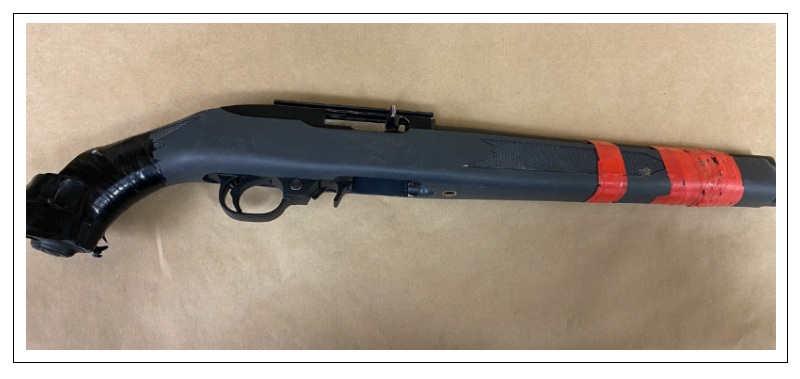
The reason for such a detailed application process is twofold. First, because of the high expectations placed on today's police officers -- honesty, dedication, trustworthiness, dependability and good health to name but five criteria to be successful. Secondly, because Canadians expect its police officers to be highly trained and informed, and to perform their duties exceptionally well even in the most dangerous of investigations; weapons offences, murders, thefts, armed robberies, vicious assaults and fights in progress. The list of criminalities which the police often face today is endless, and a police officer has to be highly qualified and prepared. Now, let us turn back the clock to the early days of the NWMP.

In days gone by, say between 1873 to 1900, the recruiting policy for the NWMP was streamlined. In his well researched book written in 2017 entitled, The North West Mounted Police 1873 to 1885, Canadian author Jack Dunn laid out the slim yet essential qualifications for the first potential recruits. Dunn wrote, "The selection criteria recommended active and able-bodied men of good character, between the ages of 18 and 40 years, with a sound constitution and the ability to ride. Literacy could be either in French or English." (Dunn: 21). In-depth background checks intended to weed out undesirables were not possible, and during the course of interviews, recruiters depended to a large extent on the truthfulness of the man being hired. The real truth was hard to uncover as there was no way to verify what recruiters were being told. Work was dangerous and laborious, therefore high emphasis was given to physicality and brute strength.
 In the early days of the Force, a common motivation among the vast majority of recruits was their want of adventure, and they truly did find hazardous and exciting travels, especially during their exploration of unknown North West Territories and during the March West in 1874. In the days of the NWMP as well, recruits were hired in a hurried fashion. Recruiting Officers worked under time restraints and the requirement was to hire as many men as possible, and get them expeditiously mounted on a horse. All in all, early recruiters did the best they could to reject undesirable characters especially when one considers the circumstances which they faced. Over time, the standards to gain entry into the Force became more and more rigid, but even so occasionally a questionable recruit did find his way into the ranks of the NWMP.
In the early days of the Force, a common motivation among the vast majority of recruits was their want of adventure, and they truly did find hazardous and exciting travels, especially during their exploration of unknown North West Territories and during the March West in 1874. In the days of the NWMP as well, recruits were hired in a hurried fashion. Recruiting Officers worked under time restraints and the requirement was to hire as many men as possible, and get them expeditiously mounted on a horse. All in all, early recruiters did the best they could to reject undesirable characters especially when one considers the circumstances which they faced. Over time, the standards to gain entry into the Force became more and more rigid, but even so occasionally a questionable recruit did find his way into the ranks of the NWMP.
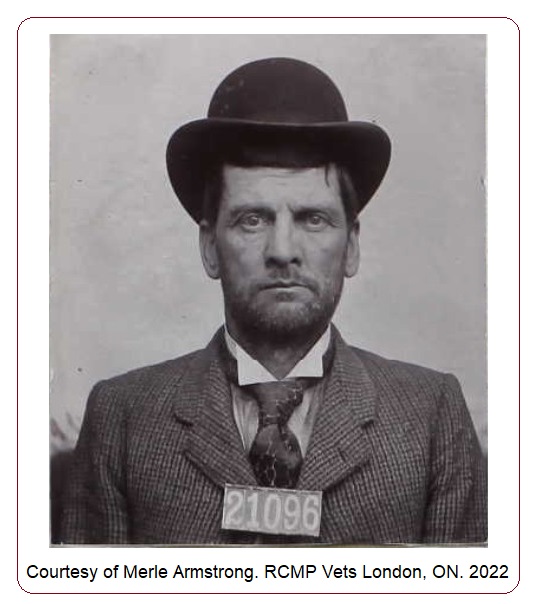 Orlando Worthington was born in Ogdensburg, New York in 1862. He immigrated into Canada and he was hired by the NWMP in mid-April, 1882. For a while it appeared as though he was just ordinary, but as the years rolled along, Worthington's reputation in the NWMP, his work ethic and his overall dependability were called into question. Senior Officers came to realize that, in spite of sufficient warnings, Worthington was a thorn in their side.
Orlando Worthington was born in Ogdensburg, New York in 1862. He immigrated into Canada and he was hired by the NWMP in mid-April, 1882. For a while it appeared as though he was just ordinary, but as the years rolled along, Worthington's reputation in the NWMP, his work ethic and his overall dependability were called into question. Senior Officers came to realize that, in spite of sufficient warnings, Worthington was a thorn in their side.
In April, 1889, Worthington first appeared in Service Court for being drunk and absent from stables. He was fined $10 by Supt. William Davis Antrobus. A few months later, he was in Service Court again for disobeying an order of Sgt William Brick Wilde. This time, he was admonished by Insp. Gilbert Sanders. But that's not all of it. In 1894, while Worthington was assigned to special duty at Onion Lake, SK, he was found intoxicated. While drunk he was obstinate in nature, and he persistently fought with a guide upon whom he depended. As well, he failed to care properly for the horses. The case was of such seriousness that Worthington was fined $10 and he was handed a one month sentence of hard labour. Afterwards, Worthington was labeled a bad character and he was dismissed from the NWMP by Supt. Joseph Howe in Battleford, SK. Worthington then left Canada for America.
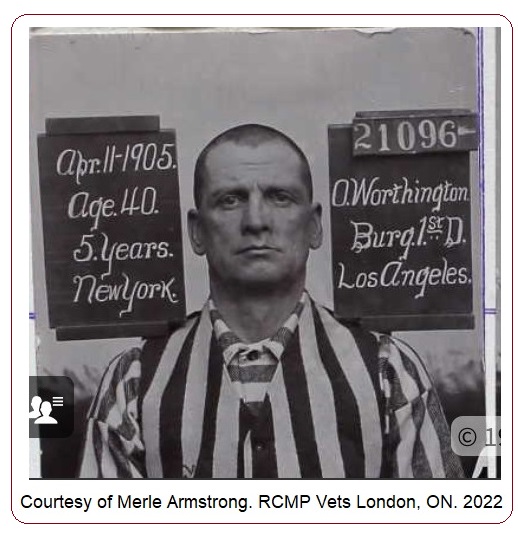 After his service with the NWMP, full and precise details are not known about the life of Orlando Worthington but a general outline can be pieced together. It is known that Worthington returned to the USA, and eventually he found his way to Los Angeles, California, when he apparently fell in with a criminal element. In 1905, he was charged and convicted for first degree burglary. He was sentenced to five years in San Quentin Penitentiary. Upon his release from San Quentin, he made his way to the east coast. He volunteered for the US-Spanish War which lasted from 1937 to 1939.
After his service with the NWMP, full and precise details are not known about the life of Orlando Worthington but a general outline can be pieced together. It is known that Worthington returned to the USA, and eventually he found his way to Los Angeles, California, when he apparently fell in with a criminal element. In 1905, he was charged and convicted for first degree burglary. He was sentenced to five years in San Quentin Penitentiary. Upon his release from San Quentin, he made his way to the east coast. He volunteered for the US-Spanish War which lasted from 1937 to 1939.
In recent weeks, RCMP Veteran Merle Armstrong discovered that Worthington died in Durval, Florida in 1940. He was 74 years of age. At first, he was buried in an unmarked grave in the Worthington family plot near his parents in the Woodlawn Cemetery in Syracuse, NY. However, in 1954, an application was made by Worthington's family for a US government Veterans flat military marker to be placed on his grave, and this request was eventually fulfilled.
Ms Kathryn Woods of Woodlawn Cemetery said on March 18th, 2022 that Orlando Worthington was buried in Section 34, Lot 11. He was buried with his parents Edward & Elizabeth Worthington, a sister and a brother-in-law Marion & Edward Oswald. Melvina & Walter Wilson are also buried there as well as another sister and her husband. Also buried in the plot is an infant by the name of Bertha Leman.
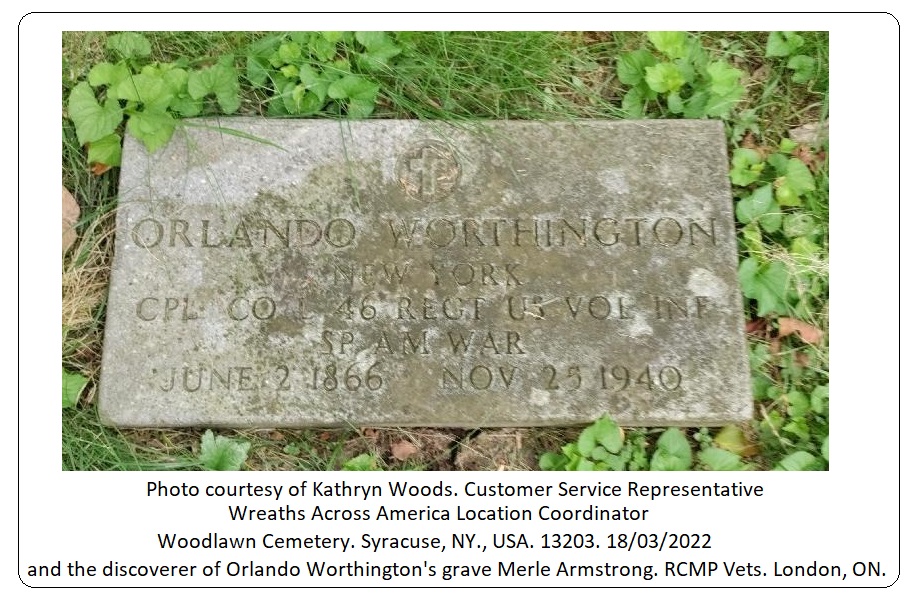
 One can't be all that harsh towards now deceased Orlando Worthington. Like so many people of his era, he lived during difficult times including two wars. He fought in the North West Rebellion of 1885, as well as the US Spanish War. Alcoholism played a part in his demise with the NWMP, and perhaps it affected his entire life. And, one doesn't know if he suffered from mental illness due to the armed conflicts in which he was involved. In his lifetime, there were few well paying jobs, or government benefits. Low value was placed on the individual's well-being.
One can't be all that harsh towards now deceased Orlando Worthington. Like so many people of his era, he lived during difficult times including two wars. He fought in the North West Rebellion of 1885, as well as the US Spanish War. Alcoholism played a part in his demise with the NWMP, and perhaps it affected his entire life. And, one doesn't know if he suffered from mental illness due to the armed conflicts in which he was involved. In his lifetime, there were few well paying jobs, or government benefits. Low value was placed on the individual's well-being.
Life is a trade off. While it is true that everyone must be held responsible for their own lives, communities also share in the responsibility to care for those people in our midst who are down and out. And as far as the RCMP is concerned, nearly all of the cadets who join the RCMP today do exceedingly well throughout their careers in law enforcement. Long ago, in many ways, Orlando Worthington was a rare exception.
I would like to thank London, ON RCMP Veteran Merle Armstrong for his help with this short story. Merle discovered the grave of Orlando Worthington in Woodlawn Cemetery in Syracuse, New York as well as the memorable photos of Worthington which were used in this piece.
Reporting from Fort Healy,
J. J. Healy
March 23, 2022
Dunn, Jack E. (2017). The North West Mounted Police 1873 to 1885. Jack E. Dunn Publisher. Calgary, AB.

